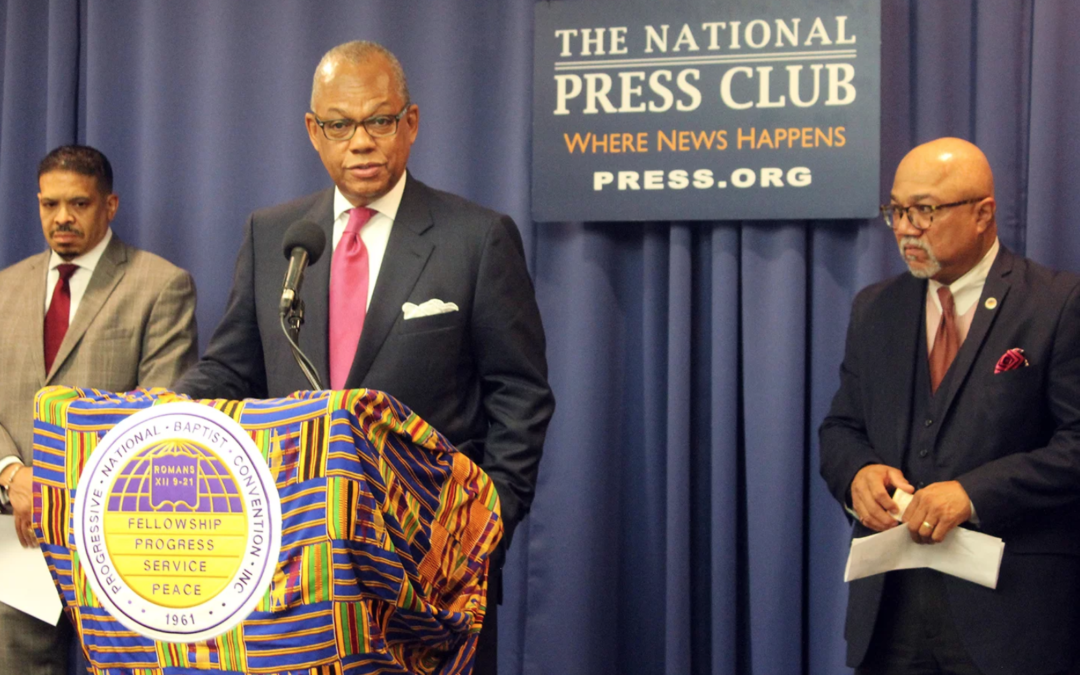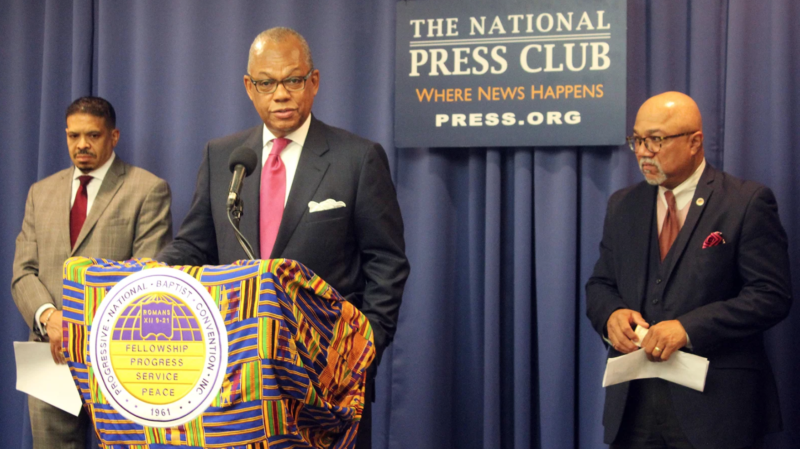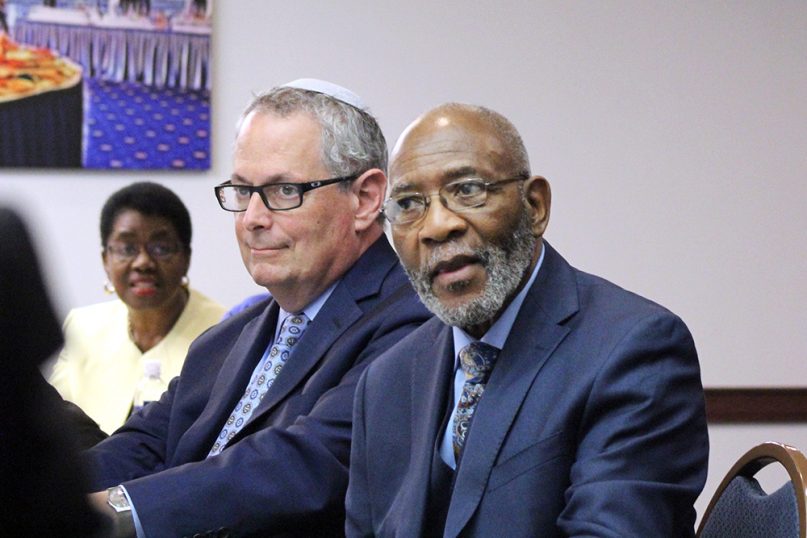
by Adelle M. Banks, RNS | Oct 10, 2018 | Headline News |

The Rev. Calvin Butts speaks during a news conference of the Progressive National Baptist Convention at the National Press Club, on Oct. 9, 2018, in Washington, D.C. RNS photo by Adelle M. Banks
Representatives of two black Baptist denominations, the Progressive National Baptist Convention and the National Baptist Convention USA, declared that they would stand apart from white liberals and conservatives alike while seeking to address a politically divided nation.
Rejecting the “politics of fear” they say has taken hold in this election season, the pastors assembled at the National Press Club said that race and spirituality should not be ignored as the two sides work to get out the vote.
“As the body of Christ, we do not serve as mere mascots of the liberal left, sent by patronizing paternalists to serve as the point on the head of their ideological spear,” reads a declaration released by PNBC President Timothy Stewart and the Rev. Calvin Butts, the denomination’s social justice chair.
“Nor do we set horses with those of the religious right who hide their rampant racism and hysterical hypocrisy amidst the existential ruins of a morally and theologically bankrupt spirituality.”
The Rev. Matthew V. Johnson Sr., the Birmingham, Ala., pastor who authored the declaration, earlier told Religion News Service that white religious conservatives and liberals have focused on opposite sides of hot-button issues such as abortion and LGBTQ rights while not giving race and racism enough attention.
“It’s not just about black special interests,” said Johnson, vice chair of the PNBC Social Justice Commission. “This is an issue of justice.”
At the news conference, Johnson noted that Democrats and others protesting the nomination of now-Justice Brett Kavanaugh showed a lack of concern about the nominee’s record on race issues. Their indifference, Johnson said, is an example of “the problem that we have with the liberal left.”
The PNBC, the denomination of the Rev. Martin Luther King Jr., formed as a breakaway group from the National Baptist Convention in the 1960s after the NBC opposed sit-ins and other civil rights protests. The presence of the Rev. Amos Brown, social justice chair of the NBC, demonstrated his group’s support for the younger denomination’s declaration.

The Rev. Amos Brown, right, and Rabbi Jack Moline, of Interfaith Alliance, attend an announcement by the Progressive National Baptist Convention at the National Press Club on Oct. 9, 2018, in Washington, D.C. RNS photo by Adelle M. Banks
Butts said that as black preachers, “We have our own view of the gospel message which is the only authentic view.” Naming Franklin Graham, Jerry Falwell Jr. and Paula White — all members of the religious right — he said, “They’re heretics as far we we’re concerned – hypocrites,” said Butts, as he closed the news conference. “And we need to be unafraid to say this and stand firmly on who we are.”
In August during its annual meeting, the PNBC protested Trump administration policies it believes are harmful to the poor, people of color and working-class families.
But Tuesday’s declaration states that the nation’s current cultural crisis is not the sole fault of its president. “The presidency of Donald Trump is not the cause of the American malady but a symptom, a consequence, an effect; although by the aid and abetting of the present administration the sickness has received license and worsened,” the declaration reads.
Speakers at the news conference said getting out the vote could be just one effect of their declaration.
“We’ve got to really vote like hell in this midterm election and in 2020 and get rid of this excuse ‘my one vote won’t count,’” said Brown. “Every vote counts. We’ve got to get that over to our congregations.”
But Butts anticipated the declaration would also lead to other steps, including black church support of personal withdrawing of money from banks, such as Wells Fargo, for their role in the subprime mortgage crisis that has disproportionately affected minority homeowners.
“We will be asking our churches to focus on action against these banks,” said Butts, the senior pastor of New York’s Abyssinian Baptist Church. “And always remember that when this economy booms, it is usually at the exploitation of black and brown people.”
Others attending the declaration announcement included representatives of the Church of God in Christ, the Interfaith Alliance, the National African American Clergy Network and the Ecumenical Poverty Initiative.
by Urban Faith Staff | Aug 18, 2017 | Social Justice |
(RNS) A coalition of African-American clergy is calling on churches to serve as sacred spaces for healing in the aftermath of violence in Charlottesville, Va., and as the nation grapples with racism and other bigotry.
“We urge churches across the country to create safe and sacred spaces for prayer, healing, dialogue and honest conversations about the history and reality of racism, bigotry, anti-Semitism and white supremacy in this nation,” the black clergy said in a Friday (Aug. 18) statement.
“Our youth and young adults especially need a place to process this assault on their being and the very soul of this nation.”
The group, which spearheaded the first-ever “African American Clergy Advocacy Day” on Capitol Hill a month ago, also denounced the hatred displayed recently in Charlottesville and the “subsequent inflammatory and detestable words of President Donald Trump supporting the hateful actions of the KKK, Nazis and white supremacist groups.”
The 10 initial signatories include leaders of the National African American Clergy Network, the Ecumenical Poverty Initiative and the National Council of Churches, as well as officials of the Presbyterian Church (USA), the Progressive National Baptist Convention and the United Church of Christ.
The black clergy called on Congress, denominational leaders, and particularly white evangelical church leaders to speak out against the “evil” of white supremacy.
They also took issue with President Trump’s assertion that “many sides” were responsible for the violence in Charlottesville.
Declaring, “No, Mr. President. There are not many sides,” the group questioned his contention that “fine people” were among both sides in the protests that turned violent and left three people dead.
“These ‘fine’ people intimidated churchgoers, attacked clergy and threw bottles from the tops of steps into the crowd of counter protesters — those who were standing against their hatred, bigotry and white supremacist values,” the online statement said.
On July 18, members of the clergy group protested the Trump administration’s proposed budget cuts affecting programs including food stamps and Meals on Wheels; 16 people were arrested. A week later they joined others in a protest of the Senate’s unsuccessful efforts to repeal the Affordable Care Act; 31 people were arrested.
The Rev. Leslie Copeland-Tune who drafted the statement, said the group plans to return to Capitol Hill in September to urge members of Congress to be more outspoken against white supremacy. The clergy also plan to visit five states represented by Congress members who hold key roles in considering the proposed budget.
by Wil LaVeist | Sep 27, 2012 | Feature, Headline News |
 Black preachers holding press conferences about gay marriage and churchgoers boycotting Election Day? I wonder if our squabbling about gay rights amid so many greater problems plaguing the black community is a symptom of a bigger issue for the church — impotence in the community. In Acts 1:8, Jesus tells of the power believers would receive to have a wide community impact. Yet, we waste energy on what is ultimately a private personal matter between a person and who they choose to live their life with. Perhaps gay marriage is that low-hanging fruit that’s easier for the church to pick at.
Black preachers holding press conferences about gay marriage and churchgoers boycotting Election Day? I wonder if our squabbling about gay rights amid so many greater problems plaguing the black community is a symptom of a bigger issue for the church — impotence in the community. In Acts 1:8, Jesus tells of the power believers would receive to have a wide community impact. Yet, we waste energy on what is ultimately a private personal matter between a person and who they choose to live their life with. Perhaps gay marriage is that low-hanging fruit that’s easier for the church to pick at.
Amid all the talk about gay marriage rights and the black church at the Congressional Black Caucus Foundation’s 42nd Annual Legislative Conference last week, I was intrigued by a panel discussion among some of the nation’s leading black preachers that actually targeted a more critical community concern. Ironically, the panel was moderated by the Rev. Al Sharpton (my Brownsville, Brooklyn homeboy), who the same day was prominent at a press conference where preachers correctly urged churchgoers to NOT sit home on Election Day in protest of President Obama’s support of gay marriage rights.
The panel dealt with the church engaging the public policymaking process. Sharpton, who heads the National Action Network, pointed out that during the civil rights movement of the ’50s and ’60s, most black church leaders sat back or criticized as the Rev. Martin Luther King Jr. and other activists risked their lives out on the limb reaching for more important community fruit. Sharpton began by asking each panelist what the church should focus on to improve the black community.

PREACHING TO THE PREACHERS: Rev. Al Sharpton moderated a panel discussion with black clergy at the Congressional Black Caucus. (Photo: Michael Holahan/Newscom)
The Rev. Charles Williams II, president of Detroit’s National Action Network chapter, stressed church involvement in economic development. “The only institution that we still own is the black church. It may not be perfect, it has faults, but it’s the best thing that we’ve got going,” he said.
Juan Thomas from Chicago said that historically black preachers and lawyers (for example, the Rev. Adam Clayton Powell and Thurgood Marshall) have worked closely together to affect public policy. This must continue. “After this cycle we need to do our part to changes these voter ID laws and suppression laws,” added Thomas, who is also an attorney and the secretary of the National Bar Association.
The Rev. Timothy McDonald, pastor of First Iconium Baptist Church in Atlanta, said that churches had abandoned discussions about “the sin of poverty” in favor of the prosperity gospel.
Bishop Vashti Murphy McKenzie, a leader of the African Methodist Episcopal denomination, noted the AME’s history of political engagement dating back to Hiram Rhodes Revels, the first black person sworn into the U.S. Congress. “We need to sit at the table while you’re (elected officials) making the decisions because we’re right there in the trenches … We can tell you what’s working and not working.”
The Rev. David Alexander Bullock of Greater St. Matthew Baptist Church in Highland Park, Michigan, targeted health care disparities such as, the HIV/AIDS epidemic. “The church refuses to move from the pulpit to the pavement … We’re sleeping with each other on Saturday, shouting on Sunday, and dying on Monday.” He also mentioned the prison industrial complex, which disproportionately targets African Americans.
The Rev. Dr. Suzanne Johnson Cook, the United States Ambassador-at-Large for International Religious Freedom, urged black clergy to get involved in policymaking, including at the international level. “We have to be local, but we have to go big, go global.” She added there needs to be more alliances with other communities, such as Hispanics, to address common concerns.
The Rev. Lennox Abrigo, of Seventh Day New Covenant in Hyattsville, Maryland, also emphasized the need for community partnerships. He mentioned his church’s relationship with the American Cancer Society to bring early diagnosis to black men who may be suffering from cancer. “I’ve promised God that I’m not going to restate the problem anymore. I’m just going to go out and make things happen,” he said.
The Rev. Dr. Wendell Anthony, president of the Detroit branch of the NAACP, also targeted economic development, noting that 50 percent of black households in Detroit make under $25,000 per year. He said the number of children under 18 living in poverty is 53 percent. “It’s not just Detroit; it’s your city,” he said. “… As a pastor, I have to speak to that on a daily basis.” There needs to be a “social gospel ministry” that speaks to public policy, he said. “We have so many issues, we can’t deal with them all, but we can deal with those issues and policies that lift people up every day.”
So what do you think? Is the church doing enough with its power to uplift the community? And, before you answer, remember that WE believers ARE the church.




 Black preachers holding press conferences about gay marriage and churchgoers boycotting Election Day? I wonder if our squabbling about gay rights amid so many greater problems plaguing the black community is a symptom of a bigger issue for the church — impotence in the community. In Acts 1:8, Jesus tells of the power believers would receive to have a wide community impact. Yet, we waste energy on what is ultimately a private personal matter between a person and who they choose to live their life with. Perhaps gay marriage is that low-hanging fruit that’s easier for the church to pick at.
Black preachers holding press conferences about gay marriage and churchgoers boycotting Election Day? I wonder if our squabbling about gay rights amid so many greater problems plaguing the black community is a symptom of a bigger issue for the church — impotence in the community. In Acts 1:8, Jesus tells of the power believers would receive to have a wide community impact. Yet, we waste energy on what is ultimately a private personal matter between a person and who they choose to live their life with. Perhaps gay marriage is that low-hanging fruit that’s easier for the church to pick at.